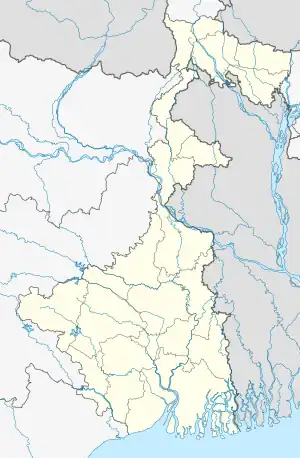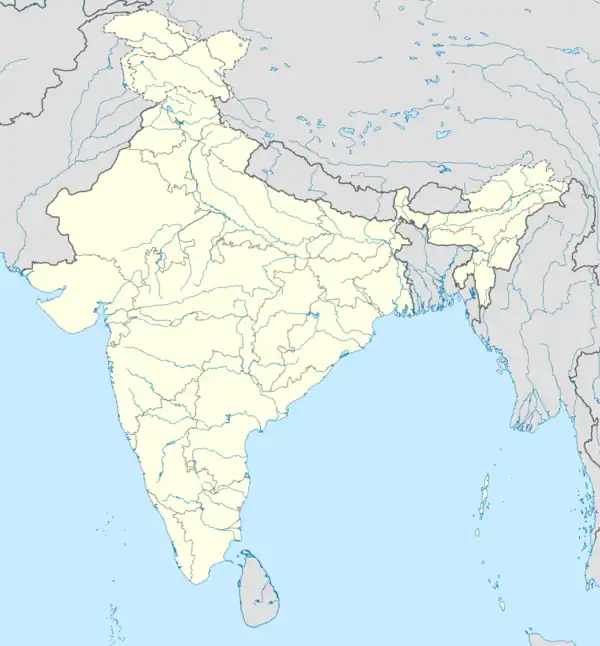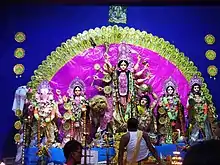Guma | |
|---|---|
Census Town | |
 Guma Location in West Bengal, India  Guma Guma (India) | |
| Coordinates: 22°50′N 88°38′E / 22.83°N 88.63°E | |
| Country | |
| State | West Bengal |
| District | North 24 Parganas |
| Government | |
| • Type | Panchayati raj |
| • Body | Guma I, Guma II |
| Elevation | 8 m (26 ft) |
| Population (2011) | |
| • Total | 12,025 |
| Languages | |
| • Official | Bengali, English |
| Time zone | UTC+5:30 (IST) |
| PIN | 743704 |
| Telephone code | 03216 |
| ISO 3166 code | IN-WB |
| Vehicle registration | WB |
| Lok Sabha constituency | Barasat |
| Vidhan Sabha constituency | Ashoknagar |
| Website | north24parganas |
Guma is a census town(CT) in the Habra II CD block of Barasat sadar subdivision[1] in North 24 Parganas district in the Indian state of West Bengal.
Geography
M: municipal town, CT: census town, R: rural/ urban centre, H: historical centre
Owing to space constraints in the small map, the actual locations in a larger map may vary slightly
Location
Guma is located at 22°50′N 88°38′E / 22.83°N 88.63°E.
Guma is located in the Ganges Brahmaputra delta region in the district of North 24 parganas, West Bengal state in eastern India. It is 38 km from Sealdah Station and 15 km from Barasat on the Sealdah-Bangaon branch line of Eastern Railway.[2] Bidyadhari River runs through Guma.
Guma Bara Bamonia and Khordabamonia forms a cluster of Census town(CT).[3]
Area overview
The area covered in the map alongside is largely a part of the north Bidyadhari Plain. located in the lower Ganges Delta.[4] The country is flat. It is a little raised above flood level and the highest ground borders the river channels.[5] 54.67% of the people of the densely populated area lives in the urban areas and 45.33% lives in the rural areas.[6]
Note: The map alongside presents some of the notable locations in the subdivision. All places marked in the map are linked in the larger full screen map.
Climate
The climate is tropical — like the rest of the Gangetic West Bengal. The hallmark is the Monsoon — from early June to mid-September. The weather remains dry during the winter (mid-November to mid-February) and humid during summer.
Temperature: 39.5 °C (103.1 °F) in May (max) and 10.3 °C (50.5 °F) in January (min)
Relative Humidity: Between 55% in March & 98% in July
Rainfall: 31 mm (1.2 in) (normal)
Demographics
According to the 2011 Census of India, Guma had a total population of 12,025, of which 6,089 (51%) were males and 5,936 (49%) were females. Population in the age range 0–6 years was 1,190. The total number of literate persons in Guma was 9,479 (87.49% of the population over 6 years).[7]
According to the 2011 Census of India, Habra Urban Agglomeration had a total population of 304,584, of which 154,863 (51%) were males and 149,723 (49%) were females. Population in the age range 0–6 years was 23,023. The total number of literate persons in Habra UA was 256,313 (91.03% of the population over 6 years).[8] The constituents of Habra Urban Agglomeration were Habra (M), Ashoknagar Kalyangarh (M), Bara Bamonia (CT), Guma (CT), Anarbaria (CT) and Khorddabamonia (CT).[9]
As of 2001 India census,[10] total Guma had a population of 9,297. Males constitute 51% of the population and females 49%. Guma has an average literacy rate of 72%, higher than the national average of 59.5%: male literacy is 79%, and female literacy is 69%. In Guma, 13% of the population is under 6 years of age.
Administration
Guma falls under the jurisdiction of Ashokenagar Police Station. Guma I and Guma II gram panchayats are responsible for development of Guma. It falls under the Assembly constituency of Ashoknagar (Vidhan Sabha constituency) and Barasat (Lok Sabha constituency). Headquarters of Habra II (community development block) is at Guma.
Panchayat and BDO office is well connected with Optical fiber broadband. A new building for traffic police has been built at Guma bus station.
Healthcare
North 24 Parganas district has been identified as one of the areas where ground water is affected by arsenic contamination.[11] Local clubs sometimes conducts health awareness programmes with the help of Department of health and Gram panchayats.
Guma Sub-Health Center is situated in the junction of Guma-Rajibpur Road and Kamarpur Road.also here now new health center besides guma 1 no panchayat. Guma is also an Open defecation free town.
102 (ambulance service) is also available for 24/7.
Education
There are two higher secondary schools and sufficient primary schools in Guma. Students wanting to proceed secondary education, sometimes have to travel to nearby towns or villages for that purpose. Other than that there are two Madrasas at Choto Bamonia and Khosdelpur. There is no college in Guma. Office of the Habra II CD Block Sub-Inspector of Schools is also in Guma.
Primary schools
- Guma Nimno Buniadi Vidyalay
- Palpara Prathomik Vidyalay
- Guma Sishu Bikash
- Nabanalanda Sikhha Niketan
- St. Francis School
- Guma juliant kg school
- Assembly Of God Church School
- Guma Public School
Higher secondary schools
- Guma Rabindra Vidyapith
- Najrul Balika Vidyalaya
Cultural
There are many Hindu Temples in Guma. Durga puja is the main attraction along with Ratha Yatra . During the festive time fair started in different grounds. During Holi everyone celebrates in their own way.

Famous temples
- Milon Mandir
- Kali Mata Mandir
- Baba Biseswar Mandir
- Graharaj Mandir
- Sitala Mata Mandir
- Maa Monosha Mandir
- Loknath Baba Mandir
- Guma Adi Durga Mandir
- Samajmilon Mandir
Guma Samsan Ghat (The Burning ghat)
The burning ghat is situated bank of Bidyadhari River. There is a Maa Kali temple beside the Ghat. This is a famous ghat in this area. 24/7 Dead body carry car facility also available here.
Cultural clubs
There are many cultural clubs is there, those clubs are organize different cultural program like Durga Puja, Kali Puja, Saraswati Puja, football tournaments, yoga, music, painting and dance competitions. Also do other social programs like blood donation, food donation, book donation. Some famous clubs are:
- Guma Renacence
- Guma Chatrabithi Club
- Guma United Club
- Guma Jagrata Club
- Barnali Sangha
- Guma Agradutt Club
Transport
Railway
Guma railway station is 38 km (24 mi) from Sealdah Station and 15 km (9.3 mi) from Barasat on the Sealdah-Bangaon branch line of Eastern Railway.[12] It is part of the Kolkata Suburban Railway system. Guma railway station has been selected to be constructed as a Model Station in the 2009 rail budget. Habra local, Gobardanga local, Thakurnagar local, Bangaon local Connects Guma to Sealdah, Bangaon and other stations of Sealdah-Bangaon branch line.
Road
Guma is situated on National Highway 112 (Jessore Road) (old number NH 35). It connects Guma to Kolkata and the Bangladesh border at Petrapole. Guma is connected to the nearby villages by Guma-Rajibpur Road, Guma-Prithiba Road and Kamarpur Road. Auto rickshaws and Electric rickshaws are the mode of public transport in Guma for traveling within the town. Auto rickshaw connects this town to its nearby villages. Other towns like Habra, Duttapukur, Barasat, Naihati, chakla dham, Madhyamgram, Kalyani, Kolkata, Bagdha, etc. are connected to Guma with buses from Habra and Barasat. Few available bus services are DN-44(Bangaon to Dakshineswar), MN-3(Barasat to Nhata), DN-35(Barasat to Balti).
Banks
ATM facilities available from the banks
- Axis Bank
- HDFC Bank
- United Bank of India
- Indian Bank
- Punjab National Bank
- Indicash
- Panasonic ATM
Economy
Guma is famous for its wooden furniture shops, clay pottery, plant nursery, bike repairing shop, metal welding shops. There are many cricket wicket manufacturing industries, those factory export the wickets to different parts of India.
Biggest market area is Guma railway station. All kind of daily consumable goods are traded here.

Guma Haat
Guma Haat (A local open-air market) is one of the oldest weekly markets, this market is open every week Thursday and Sunday. People from nearby villages come here for trade. From vegetables to grocery, fish to chicken, footwear to cloths all are sold and bought here.
Wooden furniture
The most famous business is wooden furniture. Merchants buy old furniture from various places and refurnish it for sale, also make new wooden furniture such as wooden beds, doors, frames, chairs, tables, toys.
Farming
Major farming crops are paddy, jute, and vegetables. These crops are traded in local market as well as national markets. Organic farming, Beekeeping and mushroom farming are most attracted farming nowadays. There are many mango, lychee, jackfruit, jammun gardens which product plenty of fruits. Coconut and betel nut plants frequently grow here. In winter season, date juice & jaggery is famous.


Flower and nursery
There are many flower shops are there. Merchant buy flower from Thakurnagar & surrounding and sell them here. Flower is most essential commodity in Hindu puja, wedding and other Ritual.
Many plant nursery setup are there, where plants are grown for transplanting, for use as stock for budding and grafting, or for sale. Commercial nurseries produce and distribute woody and herbaceous plants, including ornamental trees, shrubs, and bulb crops.
Husbandry
Milk industry is a growing industry in this region. Many people are employed through it, they produce raw milk and milk product and sell them Kolkata and surroundings. A dairy is a business enterprise established for the harvesting or processing (or both) of animal milk – mostly from cows or buffaloes, but also from goats & sheep – for human consumption. A dairy is typically located on a dedicated dairy farm or in a section of a multi-purpose farm (mixed farm) that is concerned with the harvesting of milk.
Goat farming involves the raising and breeding of domestic goats as a branch of animal husbandry. People farm goats principally for their meat, milk, fibre and skins.
Government own Veterinary hospital is there for best quality cow & goat breed.
References
- ↑ District-wise list of statutory towns Archived 2007-08-09 at the Wayback Machine
- ↑ Eastern Railway time table
- ↑ "District Census Handbook North Twenty Four Parganas, Census of India 2011, Series 20, Part XII A" (PDF). Page 313 - Map of Habra II CD Block. Directorate of Census Operations, West Bengal. Retrieved 1 June 2018.
- ↑ "District Census Handbook North Twenty Four Parganas, Census of India 2011, Series 20, Part XII A" (PDF). Page 13. Directorate of Census Operations, West Bengal. Retrieved 16 April 2018.
- ↑ LSS O’Malley (2009). Bengal District Gazetteers: 24 Parganas. Concept Publishing Company. ISBN 9788172681937. Retrieved 3 May 2018.
{{cite book}}:|work=ignored (help) - ↑ "District Statistical Handbook". North 24 Parganas 2013, Tables 2.1, 2.2, 2.4b. Department of Statistics and Programme Implementation, Government of West Bengal. Archived from the original on 21 January 2019. Retrieved 2 May 2018.
- ↑ "C.D. Block Wise Primary Census Abstract Data(PCA)". 2011 census: West Bengal – District-wise CD Blocks. Registrar General and Census Commissioner, India. Retrieved 23 March 2016.
- ↑ "Urban Agglomeration/ Cities having population above 1 lakh" (PDF). Provisional Population Totals, Census of India, 2011. Government of India. Retrieved 3 June 2018.
- ↑ "Constituents of Urban Agglomeration having population of 1 lakh and bove" (PDF). Provisional Population Totals, Census of India, 2011. Government of India. Retrieved 3 June 2018.
- ↑ "Census of India 2001: Data from the 2001 Census, including cities, villages and towns (Provisional)". Census Commission of India. Archived from the original on 16 June 2004. Retrieved 1 November 2008.
- ↑ "Groundwater Arsenic contamination in West Bengal-India (19 years study )". Groundwater arsenic contamination status of North 24-Parganas district, one of the nine arsenic affected districts of West Bengal-India. SOES. Archived from the original on 27 September 2007. Retrieved 24 August 2007.
- ↑ Eastern Railway time table
External links
- Map of Habra II CD Block on Page 313 of District Census Handbook
